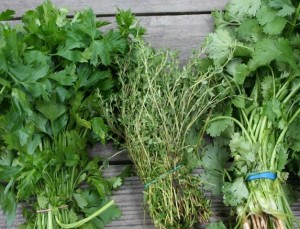 Using herbs in your meals is one of the best ways to create a lot of flavor and variety, while also adding health benefits and little-to-no calories. While dried herbs are an easy, shelf-stable option, fresh herbs pack a greater flavor profile and can also have enhanced nutrition benefits. If you’re interested in growing your own, you can buy herbs at farmer’s markets or garden stores, or plant your own seeds.
Using herbs in your meals is one of the best ways to create a lot of flavor and variety, while also adding health benefits and little-to-no calories. While dried herbs are an easy, shelf-stable option, fresh herbs pack a greater flavor profile and can also have enhanced nutrition benefits. If you’re interested in growing your own, you can buy herbs at farmer’s markets or garden stores, or plant your own seeds.
Check out several of our favorite herbs and their health benefits below!
Basil: Basil contains vitamin K, iron, calcium, vitamin A, fiber, manganese, tryptophan, vitamin B6, magnesium, vitamin C, and potassium. The health-promoting benefits are due to basil’s flavonoids and volatile oils. Various health benefits include DNA protection, anti-bacterial properties, anti-inflammatory effects, and providing nutrients essential for cardiovascular health.
Oregano: Not just for pizza, oregano is a great herb used in Mediterranean and Mexican cuisines. It’s plentiful in vitamin K, manganese, iron, fiber, calcium, vitamin E, and tryptophan. Mostly due to its volatile oils, oregano has health benefits promoting anti-bacterial effects and works as a potent antioxidant.
Cilantro: Cilantro has been medicinally used as a cleansing agent in some cultures. It has been used to effectively remove heavy metals and other toxic agents from the body. The oil in the cilantro plant creates a positive effect on the digestive tract, as it aids human production of digestive enzymes, acids, and juices. Other health properties include anti-inflammatory benefits, anti-bacterial properties, lowering of LDL cholesterol/ increasing HDL cholesterol (the “good” cholesterol), can reduce gas and nausea, can contain immune system-boosting properties, and many more.
Rosemary: Rosemary is rich in fiber, iron, and calcium. This herb contains properties useful for stimulating the immune system, increasing circulation, and improving digestion. It also contains anti-inflammatory properties and has been shown to increase blood flow to the brain and head.
Dill: Dill contains the nutrients calcium, manganese, iron, fiber, and magnesium. Due to its monoterpene and flavonoid content, dill provides health benefits including antioxidant protection against free radicals and carcinogens, and can also have anti-bacterial affects. Additionally, the strong calcium content can help prevent bone loss.
Peppermint: The nutrients in peppermint are vitamin A, manganese, and vitamin C. Peppermint, particularly the oil in peppermint, can help alleviate symptoms associated with irritable bowel syndrome, including indigestion, dyspepsia, and colonic muscle spasms. Peppermint also contains phytonutrients that can lead to potential anti-cancer agents, anti-microbial properties, and substances that can help some individuals breathe easier.
Parsley: Parlsey contains vitamins K, C, and A, folate, and iron. Parlsey promotes overall health wellness, including special benefits from its rich source of antioxidants, a healthy heart, and protection against rheumatoid arthritis.
